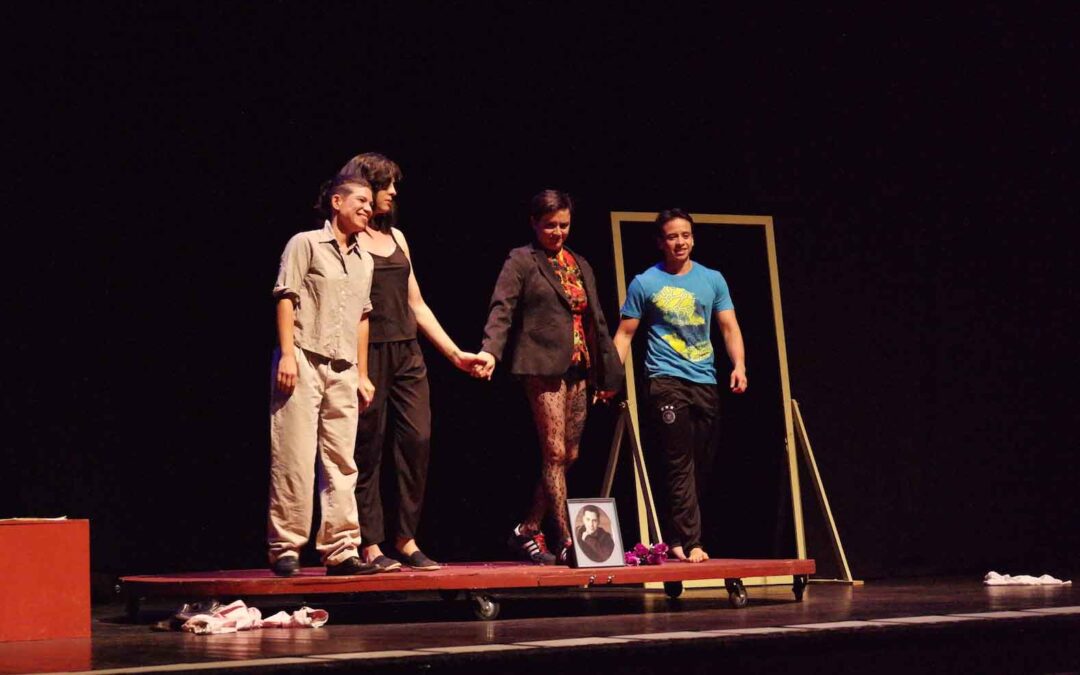
Feb 27, 2015 | Events, News
Presentación de la obra de teatro DESIDENCIAS y debate. Este es el primer evento de esta indóle que la CIJ lleva a cabo a favor de la promoción de los derechos humanos de las personas LGBTI en Guatemala.
La CIJ en asocio con la Oficina del Alto Comsionado de las Naciones Unidas para los Derechos Humanos en Guatemala (OACNUDH), el Programa Conjunto de las Naciones Unidas sobre el VIH/SIDA (ONSIDA), la Procuraduría para la Defensa de los Derechos Humanos (PDH) y con la colaboración de OASIS, llevó a cabo la presentación de la Obra DESIDENCIAS de la Colectiva Siluetas y la entrega de la Guía para profesionales del CIJ sobre orientación sexual, identidad de género y Derecho Internacional de los Derechos Humanos.
A la actividad asistieron más de 250 personas de diferentes organizaciones de la sociedad civil, operadores de justicia, estudiantes universitarios y público en general.
La Colectiva Siluetas inció a mediadios del año 2001 y actualmente la intergran tres guatemaltecas: Camilia Urrutia, Tatiana Palomo y Lu Robles y, la salvadoreña, Laia Cañénguez. La puesta en escena de la Obra DESIDENCIAS estuvo a cargo de Camila Urrutia, Laia Ribera, Lola Vásquez y Gabriel Álvarez, actrices lesbianas, transgénero y transexuales.
La obra expone muchos tabús dentro de la sociedad guatemalteca sobre la identidad sexual y la orientación de género.
La CIJ impulsará nuevas acciones para la promoción de la no discriminación y del derecho a la igualdad así como de otros estándares internacionales a favor de las personas LGBTI en Guatemala.
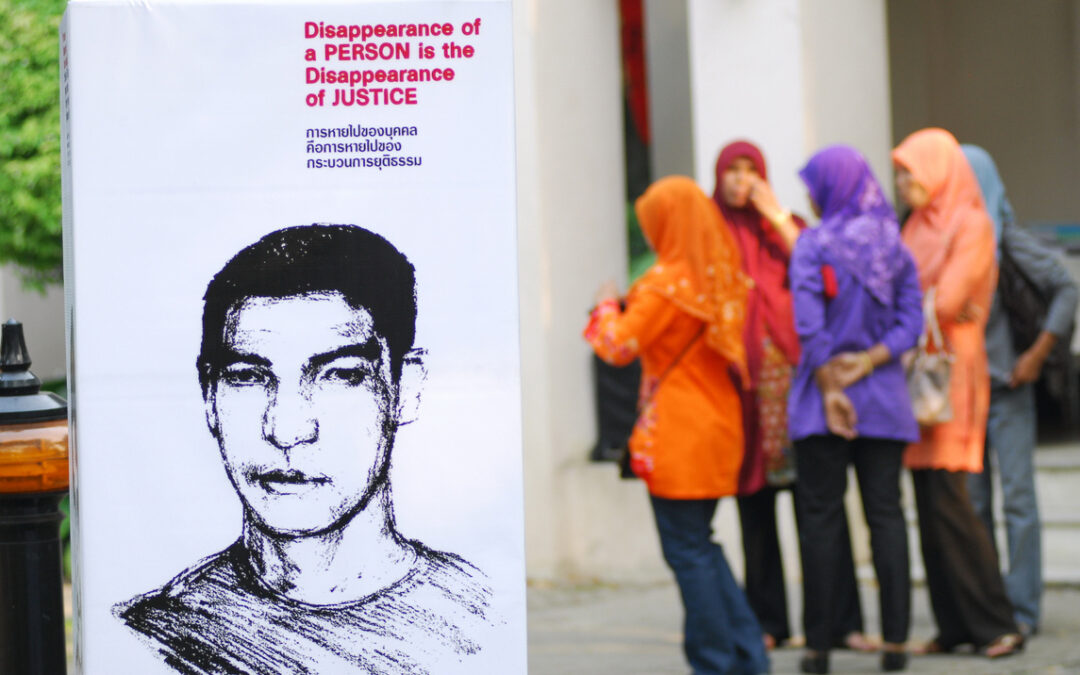
Feb 27, 2015 | News
The Nepali government must fully implement yesterday’s decision of the Supreme Court rejecting the possibility of amnesties for perpetrators of serious human rights abuses during the country’s civil war, said today the ICJ.
The decision, by a three-person special constitutional bench, composed of Justice Kalyan Shrestha, Justice Baidhya Nath Upadhyay and Justice Cholendra Shumsher JB Rana, struck down the amnesty provision of the Commission on Investigation of Disappeared Persons, Truth and Reconciliation Act 2014 (TRC Act) promulgated last May 2014.
The Court also ruled that only the judiciary, and not the Commissions established by the TRC Act, can determine the criminality of any violations committed in the context of the country’s decade-long conflict.
“Nepal’s Supreme Court has once again firmly reasserted the right of the victims of human rights violations to seek justice,” said Sam Zarifi, ICJ’s Asia Director. “This bold and principled decision should finally end the cynical attempts by politicians from all Nepal’s major parties, as well as the military, to legislate impunity and shield themselves from accountability.”
The decision distinguished between the jurisdiction of the courts and the criminal justice system, and the non-judicial reconciliation and truth-seeking mechanisms established by the TRC Act.
In the months before the decision, the government had essentially frozen the prosecution of claims already before various courts, and had blocked the filing of First Information Reports (FIRs) by victims trying to lodge new complaints.
“Now, the government must not only remove obstacles to these cases, it must commit itself to prosecuting such claims,” Zarifi added. “The Government must immediately take all necessary steps to implement the court ruling including to ensure criminal investigation of FIRs, and address the concerns raised by the victims on the formation of the Truth and Reconciliation Commission and Commission of Inquiry on Enforced Disappearance.”
This is the second time that the Nepali Supreme Court has rejected the amnesty scheme introduced by the Nepali government.
On 2 January 2014, the Supreme Court had declared unconstitutional the Ordinance on the Truth and Reconciliation Commission (TRC Ordinance).
However, the Government effectively ignored the Court order and introduced a slightly modified version of the 2013 Ordinance replicating almost all of the provisions of the TRC Ordinance, including many of its problematic aspects, such as the ‘amnesty’ provision.
“The Government, with the help of the international community, must now dedicate itself to meeting the promise of the political parties to provide justice, truth and reparations to the victims and survivors of the conflict,” said Zarifi. “Only doing so will help end the country’s cycle of impunity.”
Contact:
Sam Zarifi, ICJ Asia Pacific Regional Director (Bangkok), t: +66 807819002; email: sam.zarifi(a)icj.org
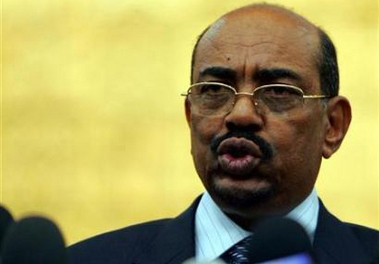
Feb 19, 2015 | News
The ICJ and other rights groups welcome the decision Africa’s main human rights treaty body has made which recognizes Sudan’s obligation to protect human rights defenders and to ensure that their work promoting and protecting the rights of others is not hindered or frustrated.
The ICJ, the International Federation for Human Rights (FIDH), the World Organisation against Torture (OMCT), the African Centre for Justice and Peace Studies (ACJPS) and REDRESS hail the important decision of the African Commission on Human and Peoples’ Rights (ACHPR), published on 13 February 2015, which called on Sudan to effectively investigate and prosecute the security and intelligence officers alleged to be responsible for the arbitrary arrest, torture and ill-treatment of three prominent human rights defenders; to reopen and unfreeze the bank accounts of a human rights organization shut down in connection with the case and to pay them compensation.
Human rights defenders Monim Elgak, Amir Suliman and the late Osman Hummaida were targeted for their supposed cooperation with the International Criminal Court in a pending case against the President of Sudan Omar Al Bashir (photo) arising from international crimes committed in Sudan’s Darfur region.
The three human rights defenders were arrested on 24 November 2008 by Sudan’s National and Intelligence Services (NISS) and subjected to torture and ill-treatment for three days.
After their release, they were effectively forced to flee Sudan because of their fear of further persecution, given the impunity enjoyed by the security and intelligence services and the inaction of the Sudanese government.
Suliman was Director of the Khartoum Centre for Human Rights and Environmental Development (KCHRED), which in 2009 was shut down by the Sudanese authorities and had its bank accounts frozen.
Hummaida, an ardent advocate for human rights who founded the Khartoum Centre and set up the ACJPS in Uganda, after his release, to ensure continued reporting of the human rights situation in Sudan, died in 2014.
The complainants turned to the ACHPR in 2009. The Commission found their complaint admissible in 2012, agreeing that the Sudanese justice system prevented them from obtaining redress in Sudan.
OMCT and FIDH intervened on their behalf at the ACHPR and the complaint was supported by the ICJ, ACJPS and REDRESS.
Reacting to the decision, Amir Suliman, Legal Programme Coordinator of ACJPS and complainant in the case, said: “The African Commission’s decision is an important recognition of the harm caused not only in our own case but the daily harm caused to the Sudanese people through the actions of the security and intelligence services. It also highlights the lack of effective safeguards against torture and remedies for victims.”
Monim El Jak, complainant in the case and Acting Chairperson of the Commission for the Protection of Civilian and Human Rights in the conflict zones of Southern Kordofan and Blue Nile, said: “We hope this decision will make the Sudanese government stop and reflect on its ongoing crackdown on civil society groups and human rights activists and also helps to put an end to other human rights violations.”
The UN Human Rights Defenders Declaration establishes that states must take effective measures to facilitate the work of human rights defenders and protect their rights.
Gerald Staberock, OMCT Secretary General, added: “The ruling sends a powerful message against torture and for the protection of those who fight torture and impunity in Sudan and in Africa. Sudan has now to fully implement and comply with this ruling providing reparations. It is time for all to recognize the vital role human rights and anti-torture activists play for the benefit of their societies.”
Karim Lahidji, the FIDH President, said: “The decision of the African Commission is significant and comes in a context where Sudanese human rights defenders continue to work in an environment that is marked by extreme insecurity and rampant impunity. Sudan must ensure that reprisals against those advocating for justice and fundamental rights and freedoms are no longer tolerated and unpunished.”
Arnold Tsunga, ICJ Africa Regional Programme Director, said: “The Government of Sudan must now expeditiously comply with the findings of the African Commission to provide reparation to the victims, as well as to ensure guarantees of non-repetition.”
Lutz Oette, REDRESS Counsel, added: “Human rights defenders continue to be harassed, arbitrarily arrested, detained, and prosecuted in Sudan, or driven into exile. The African Commission’s decision is a timely reminder of Sudan’s obligations to protect human rights defenders, and to put a stop to its current practice.”
Contact:
Arnold Tsunga, ICJ Africa Regional Programme Director, t +27 73 131 8411, e arnold.tsunga(a)icj.org
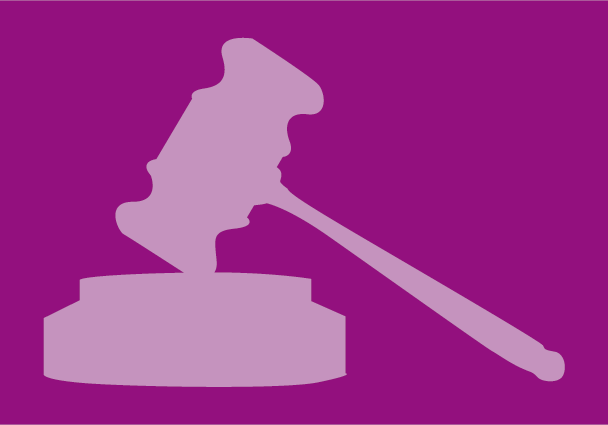
Feb 19, 2015 | Адвокаси, Юридические заявления
Сегодня МКЮ представила информацию Комитету ООН по правам человека до начала рассмотрения седьмого периодического доклада Российской Федерации в соответствии с Международным пактом о гражданских и политических правах (МПГПП).
В представленном документе обращается внимание на обеспокоенность МКЮ в отношении независимости судебной власти в Российской Федерации, которая остается слабой, поскольку многие судьи не понимают, что означает практическое применение независимой судебной власти. Во многих случаях они склонны к чрезмерному влиянию либо из внешних интересов, либо изнутри судебной иерархии.
В этом представлении рассматриваются три аспекта, вызывающих особую озабоченность:
- Процесс отбора, назначения и продвижения для судей, в котором существует разрыв между правом и практикой, и «внепроцедурное» влияние и сокращения сохраняются;
- Судебная дисциплинарная система, в частности увольнение судей; а также,
- Недавний процесс назначения судей в Верховный суд.
Без всесторонней реформы, направленной на устранение этих структурных недостатков, препятствует право каждого на справедливое разбирательство в компетентных, независимых и беспристрастных судах, установленных законом, гарантированных статьей 14 МПГПП.
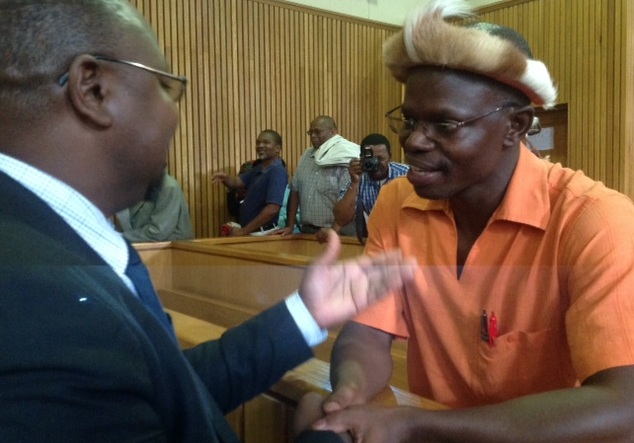
Feb 17, 2015 | News
Alleging a range of human rights violations by Swaziland in the cases of Thulani Maseko and Bheki Makhubu, leading legal advocates today filed a petition with the UN Working Group on Arbitrary Detention (UNWGAD) in Geneva.
The American Bar Association’s Center for Human Rights, the global law firm Hogan Lovells and the ICJ jointly produced a petition calling for the UNWGAD to issue an opinion regarding the lawfulness of the continued incarceration of Thulani Maseko, an internationally recognized human rights lawyer and feature writer for The Nation magazine.
“The consequences of this arbitrary action against Thulani Maseko have not only violated his rights and exacted a heavy personal toll, but have also highlighted the rule of law deficit in Swaziland,” said Wilder Tayler, ICJ’s Secretary General. “Thulani Maseko has been denied his right to express an opinion on public affairs and the administration of justice, guaranteed under international law and affirmed in the UN Basic principles on the Role of lawyers.”
Thulani Maseko and journalist Bheki Makhubu were charged with two counts of contempt of court emanating from articles published in February and March 2014, in which they questioned circumstances surrounding the arrest of a government vehicle inspector.
They were sentenced to two years of imprisonment, without the alternative option of a fine at the end of a trial largely condemned by leading international rights groups as unfair and not complying with international standards on the right to a fair trial.
Some of the fair trial guarantees that have been breached, according to the legal petition filed with the UNGWAD, include the right to be tried by an independent and impartial tribunal; right to a public hearing; right to a legal counsel; right to the presumption of innocence; right to bail; and right to protection of the law.
“The use of contempt of court proceedings to suppress the right to freedom of expression is a violation of international human rights law,” said Marc Gottridge, partner at Hogan Lovells. “The right to freedom of expression is guaranteed in the Swazi constitution and international law, including treaties to which Swaziland is a party.”
“The general failings of the Swazi judiciary with respect to independence and impartiality makes it reasonable to conclude that there cannot be an effective domestic remedy for Thulani Maseko,” he added.
Contact:
Arnold Tsunga, Director, ICJ Africa Regional Programme, t +27 716 405 926 or +41 762 399 032, e arnold.tsunga(a)icj.org,
Matt Pollard, Senior Legal Adviser, ICJ, Centre for Independence of Judges and lawyers, t +41 22 979 38 12, e matt.pollard(a)icj.org
Marc Gottridge, Partner Hogan Lovells, t +1 212 918 3000, e marc.gottridge(a)hoganlovells.com
Ginna Anderson, Senior Counsel, Center for Human Rights, American Bar Association, t +1 202 442 3438, e ginna.anderson(a)americanbar.org
Background:
Thulani Maseko was arrested on 17th March 2014 following a warrant of arrest that was issued by the Chief Justice Michael Ramodibedi on his own motion.
This was after he had written an article titled “Where the Law Has No Place” criticising the courts for the way that a fellow Swazi citizen Mr Gwebu Bhantshana had been arrested and detained and the wider implications of that case on the rule of law in Swaziland.
Save for 3 days in April 2014 when he was released following Judge Mumcy Dlamini’s judgment declaring his arrest and detention wrongful and illegal, Thulani has been in custody since his initial arrest. Mr. Maseko was initially held at Sidwashini Correctional facility before he was taken to Big Bend Correctional facility, where he is currently lodged.
Further background material can be found here:
http://www.americanbar.org/news/abanews/aba-news-archives/2014/04/statement_of_jamesr.html
https://www.icj.org/swaziland-icj-condemns-the-harsh-prison-term-imposed-on-thulani-maseko-and-bheki-makhubu/
https://www.icj.org/swaziland-icj-condemns-the-conviction-of-celebrated-human-rights-lawyer-and-prominent-journalist-on-charges-of-contempt-of-court/
https://www.icj.org/swaziland-icj-concerned-at-detention-of-human-rights-lawyer-and-journalist/
Download the petition:
Swaziland-Maseko WGAD Petition-Advocacy-2015-Eng (full text in PDF)
The lawyers at Hogan Lovells US LLP who worked on this petition are Marc Gottridge, Dianne Milner, Allison Holt and Hans H. Hertell.









